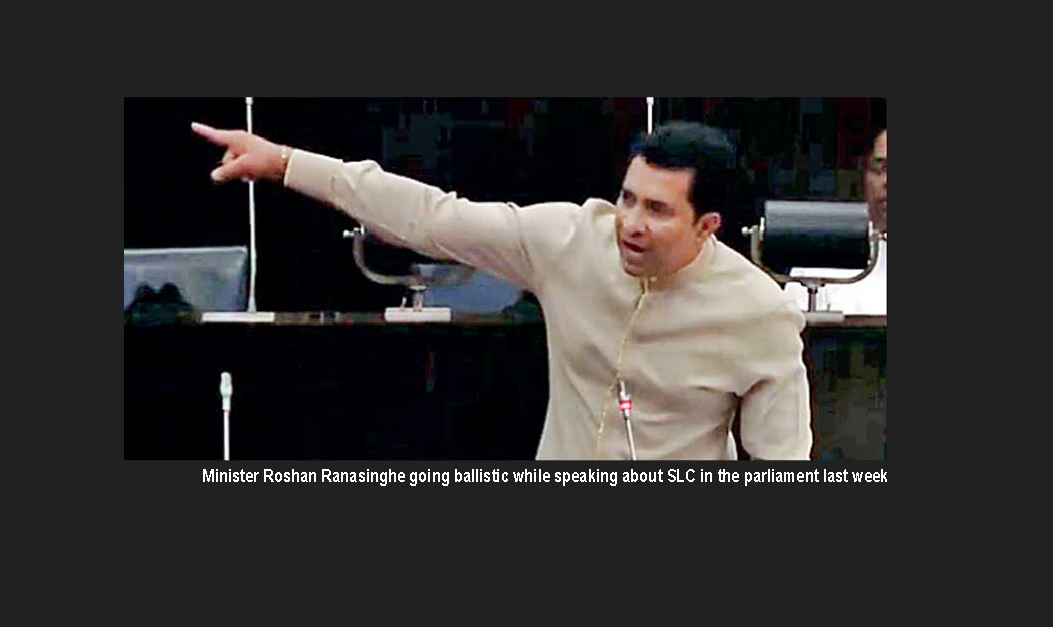Sri Lankan cricketers’ abysmal performance during the past several tournaments and very serious allegations of corruption against Sri Lanka Cricket (SLC) have brought about tensions among the three branches of government to all intents and purposes strange as it may sound. The Parliament has asserted its authority vis-à-vis the Executive and the Judiciary in dealing with SLC.
In a dramatic turn of events, on Thursday, the parliament unanimously resolved to remove the current office-bearers of SLC over allegations of corruption, following an interim injunction issued by the Court of Appeal, on Wednesday, restoring the SLC Executive Committee, which Minister of Sports had dissolved and replaced with an interim committee the previous day. The members of both sides of the House closed ranks and moved a motion calling for the disbandment of SLC EXCO. The government MPs did so although some influential persons close to President Ranil Wickremesinghe were said to be backing the SLC officials under a cloud. Some SLPP MPs backed the resolution reluctantly, but the fact remains that it was ratified unanimously.
The International Council of Cricket (ICC) lost no time in suspending Sri Lanka’s membership, citing government interference in the cricket administration as the reason for its drastic action, which is expected to strengthen the position of the beleaguered SLC officials and the government politicians who are supporting them. But the public has welcomed the parliamentary resolution and the Sports Minister’s action against the current SLC administration.
Legislature prevails over Executive
One of the main criticisms against Sri Lanka’s presidential system is that the Executive President is all powerful and undermines the other branches of government—Parliament and the Judiciary—and endangers democracy because he or she enjoys legal immunity and enormous powers as the head of state, head of government and the commander-in-chief of armed forces. This fact was borne out by the manner in which some Presidents exercised their executive powers.
The first Executive President of Sri Lanka, J. R. Jayewardene, once boasted that he was so powerful that the only thing he could not do was to make a woman a man and vice versa. But the legislature becomes politically stronger than the President when his or her party fails to secure a parliamentary majority as we saw from 2001 to 2004 under President Chandrika Bandaranaike Kumaratunga and from 2015 to 2019 under President Maithripala Sirisena.
Incumbent President Ranil Wickremesinghe’s party, the UNP, has only a single seat in the parliament, and the SLPP, upon which the President is dependent for parliamentary support, is becoming assertive. Wickremesinghe cannot bend the parliament to his will easily unlike his predecessors; J. R. Jayewardene, Ranasinghe Premadasa, D. B. Wijetunga (until the election of the SLFP-led People’s Alliance government in August 1994), Kumaratunga (except the 2001-2004 period), Mahinda Rajapaksa and Gotabaya Rajapaksa (until his ouster last year) controlled the legislature through their political parties. That may be the reason why President Wickremesinghe could dissuade the government parliamentary group from co-sponsoring the recent resolution against SLC.
Friction between Parliament and Judiciary
The Bar Association of Sri Lanka (BASL) has expressed serious concern about the fact that the parliament on Wednesday and Thursday, criticized the judiciary, especially the Court of Appeal interim injunction that stayed the dissolution of the SLC EXCO. Frowning on the court ruling at issue, some MPs even took swipes at the judiciary so much so that Minister of Justice Wijeyadasa Rajapaksa urged the public not to lose faith in the judiciary.
It is unfortunate that judicial proceedings happened to be criticized in the parliament, as BASL has rightly pointed out, and such situations have to be avoided. The three branches of government should uphold the principle of the separation of powers, and clashes among them adversely impact democracy.
Flash in the pan?
It may be argued that the coming together of the MPs of the government and the Opposition in the parliament on Thursday was only a flash in the pan; the government members threw their weight behind Sports Minister Ranasinghe, who defied President Wickremesinghe, because they could not afford to do otherwise, given overwhelming public support for drastic action against the SLC administration, and they also knew that the resolution would not be so serious as to threaten the survival of their government.
True, some of the ruling party MPs did not want to stand up and be counted; they craftily prevented a division being taken on the joint motion so that they would not have to vote either for or against the motion. But last year’s popular uprising and protesters’ call for the resignation of all 225 MPs seem to have prompted the parliament to be responsive to public opinion unlike in the past. Whether their cooperation will be extended in respect of other issues as well remains to be seen.
Political undercurrents
The political undercurrents of the parliamentary resolution in question are of interest. The Opposition sought to kill two birds with one stone by backing the Sports Minister’s action against the cricket administrators. It wanted to endear itself to the cricket -crazy public smarting from the pathetic performance of the national cricketers in the ongoing world cup tournament, and to settle political scores with President Wickremesinghe, who faulted Minister Ranasinghe for having dissolved the SLC EXCO and tried to make the latter dissolve the interim committee. The Opposition arguably achieved both objectives.
SJB leader Sajith Premadasa was able to shore up his image by taking on the SLC management, defending Minister Ranasinghe to the hilt and initiating the parliamentary resolution, which is nonbinding but will send a powerful message to the Executive and the Judiciary.
There is reason to believe that the SLPP leaders who are at loggerheads with President Wickremesinghe allowed or even encouraged their MPs to back Minister Ranasinghe together with the Opposition to win brownie points with the public and a show of strength for the consumption of Wickremesinghe, who has not granted their request that some of their district leaders be accommodated in the Cabinet.





